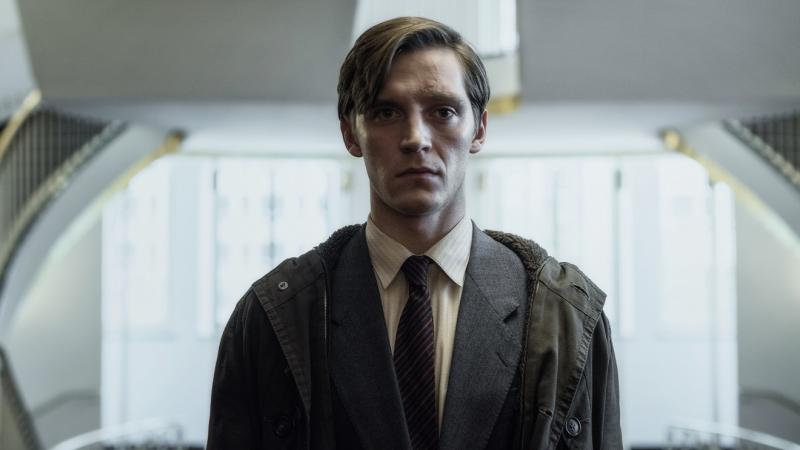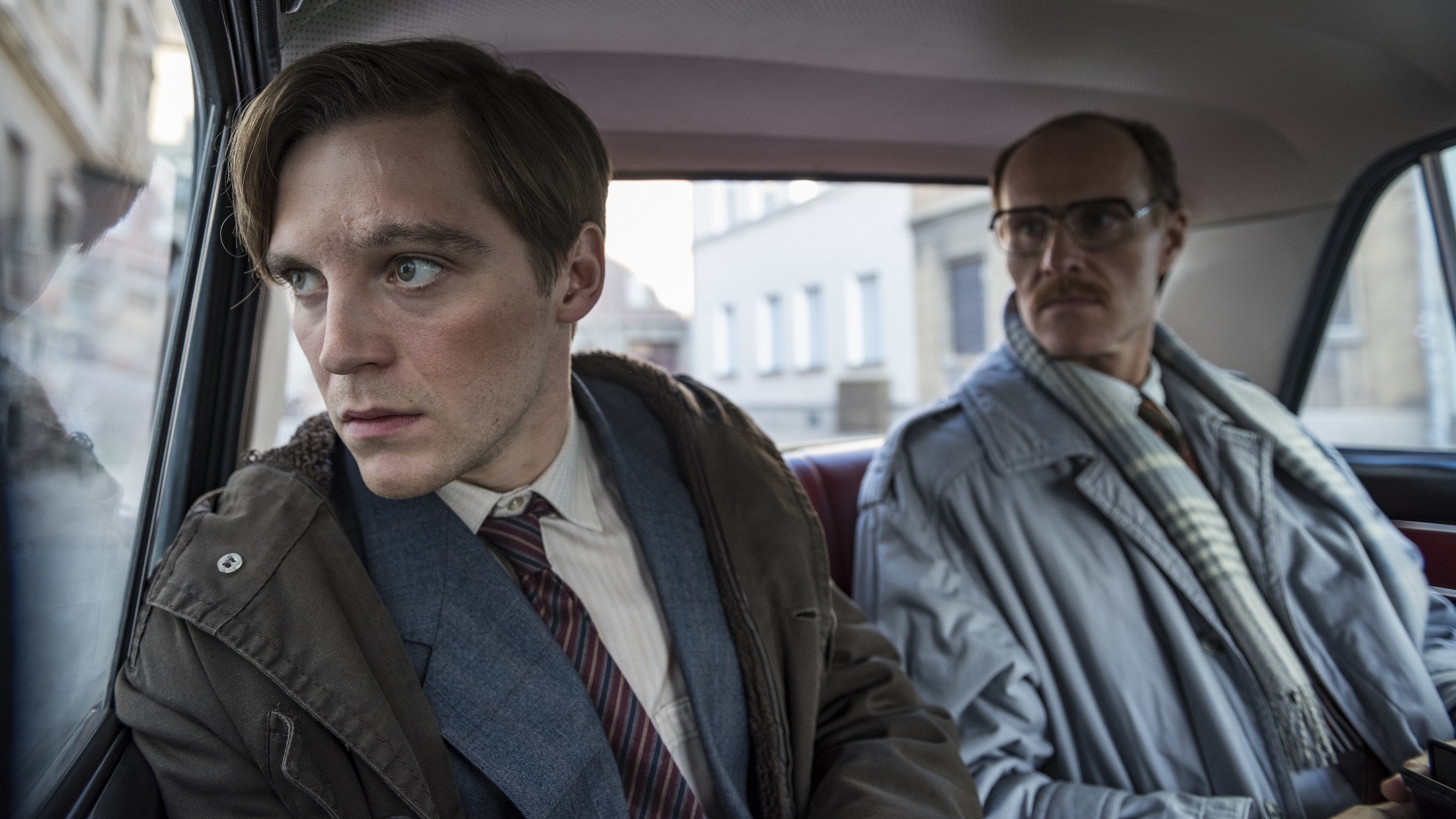Deutschland 89, Channel 4 review - the Wall comes down, what next? | reviews, news & interviews
Deutschland 89, Channel 4 review - the Wall comes down, what next?
Deutschland 89, Channel 4 review - the Wall comes down, what next?
Compulsive start to final series of the East German spy drama that's much more

Joerg and Anna Winger’s gripping drama of East Germany, a loose portrait set over the final decade of that country’s existence, has reached its culmination, and this first episode of Deutschland 89 landed us right in the unpredictable maelstrom of history.
Jonas Nay picks up as the series’ winning hero, Martin Rauch – surely no one else could manage quite that look of wide-eyed, puppyish innocence – with a growing, if still carefully guarded confidence. He has come a long way from the naive border guard whose recruitment as a spy became a baptism of fire which saw him narrowly averting nuclear meltdown at the end of Deutschland 83. The follow-up series felt like something of a detour after that, with Martin put out to grass in Africa, before his inimitable aunt Lenora (Maria Schrader) brought him in to assist with her arms-dealing shenanigans. Though we were kept abreast of events back home, the thrust of the drama moved into rather more predictable thriller territory.
Martin was at another crossroads of history, hovering Zelig-like around the edges
Deutschland 86 ended with Lenora in custody in West Berlin – her shock was considerable, but if anyone is going to rebound, it will be her! – and Martin back in the ranks of the HVA, the foreign spy branch of the Stasi, where he had begun six years earlier. Quite which master he was serving now remained another matter, however – was it the KGB in Moscow, where childhood sweetheart Annett has somehow ended up, or the BND, the West German Intelligence Service, with which he had been developing more recent romantic attachments? The acronyms alone were daunting. The Wingers have cleverly left certain plot details between the series loose, meaning that we were plunged into the ongoing action, rather like Martin himself, and left to work out just what was happening. Or did he actually know very well, and was off on his own path, just as he had with that “Able Archer” nuclear standoff back in 1983?
Anyway, here he was at another crossroads of history, hovering Zelig-like around the edges. The creators of Deutschland 89 have gleefully tweaked their history, but they certainly captured to the full the drama of those fateful hours that saw crowds of East Berliners flocking through Checkpoint Charlie. The immediate issue at stake was when travel restrictions for East Germans, who had anyway been crossing to the West for some time via Czechoslovakia, would be relaxed. In almost off-the-cuff closing remarks at that evening’s press conference we witnessed Party spokesperson Günter Schabowski coming out with those fateful words, “As far as I know... effective immediately, without delay...”. The rest, as we all know, is history. It certainly caught everyone by surprise, from the gatherings of dissidents whose dreams had suddenly come true to the CIA listening room in the American Embassy, where the euphoria seemed somehow less infectious. Nowhere more so, however, than at HVA headquarters itself, a location we have come to know rather well from the organisations’s hopeless attempts to earn foreign currency that were a recurring leitmotif in series two. It’s practically second home for Martin now, given that his mother Ingrid seems to have found a job there, not to mention Walter, the father he had only discovered back in the first series, who's still a fixture even though his career hasn't recovered fom the upsets of what happened back then. It was a priceless moment as the whole crowd, gathered in that joyless conference room, watched those television images of border guards letting people through the Wall, accompanied by the Bach Mass “Kyrie Eleison” that gave this first episode its title. (Pictured above: Jonas Nay with Niels Bormann, as Fritz Hartmann)
The rest, as we all know, is history. It certainly caught everyone by surprise, from the gatherings of dissidents whose dreams had suddenly come true to the CIA listening room in the American Embassy, where the euphoria seemed somehow less infectious. Nowhere more so, however, than at HVA headquarters itself, a location we have come to know rather well from the organisations’s hopeless attempts to earn foreign currency that were a recurring leitmotif in series two. It’s practically second home for Martin now, given that his mother Ingrid seems to have found a job there, not to mention Walter, the father he had only discovered back in the first series, who's still a fixture even though his career hasn't recovered fom the upsets of what happened back then. It was a priceless moment as the whole crowd, gathered in that joyless conference room, watched those television images of border guards letting people through the Wall, accompanied by the Bach Mass “Kyrie Eleison” that gave this first episode its title. (Pictured above: Jonas Nay with Niels Bormann, as Fritz Hartmann)
Spy boss Markus Fuchs was speechless, but was soon reassured out of his dark thoughts by his secret girlfriend Barbara, the one who has actually been pulling the strings at the outfit for ages, that any radical change meant “new opportunities and new winners”. There was a wonderful bathos as she reminded him that she was no Eva Braun and this was no bunker, bringing home how the Wingers have added a subtly parodic slant to their depictions of these unlikely, often really rather incompetent apparatchiks who have somehow ended up at the apex of GDR power. Their future antics look set to be no less improbably comic.
“The country has to reinvent itself, as do a lot of our characters,” the co-writers have said of the protagonists of this final series, and their Deutschland trilogy has been at its best when it’s stuck close to the human emotions of the individuals who make up the population of the nation that is here heading towards oblivion. We have taken them seriously, we have believed in, and with them. The observation of the details of everyday life has been no less insightful than the humour has been generous, all of it accompanied by a lovely (though more muted here than before) musical score from Reinhold Heil, and foregrounded in the production design of Lars Lange that catches the inhuman style of the public spaces particularly well.
Martin looks like he has a new love interest coming along in the form of feisty teacher Nicole, who turned up unexpectedly in the long bar scene at the centre of this first episode. She exclaimed at one point that it would be better “if this shitty country just collapsed”, a sentiment widely shared by all present. But a moment before Martin has been talking with his Robotron friends, who have just received the new apartment that they thought would take years to materialise. What’s better, they ponder, a new flat – or the chance to head for the West, where they will feel almost refugees? Bliss was it in that dawn to be alive. No doubt. But the longterm adjustments will be far more gruelling, as East Germany recedes into history: it’s even harder, after all, to go home again when that home itself has gone for good.
The future of Arts Journalism
You can stop theartsdesk.com closing!
We urgently need financing to survive. Our fundraising drive has thus far raised £49,000 but we need to reach £100,000 or we will be forced to close. Please contribute here: https://gofund.me/c3f6033d
And if you can forward this information to anyone who might assist, we’d be grateful.

Subscribe to theartsdesk.com
Thank you for continuing to read our work on theartsdesk.com. For unlimited access to every article in its entirety, including our archive of more than 15,000 pieces, we're asking for £5 per month or £40 per year. We feel it's a very good deal, and hope you do too.
To take a subscription now simply click here.
And if you're looking for that extra gift for a friend or family member, why not treat them to a theartsdesk.com gift subscription?
more TV
 Down Cemetery Road, Apple TV review - wit, grit and a twisty plot, plus Emma Thompson on top form
Mick Herron's female private investigator gets a stellar adaptation
Down Cemetery Road, Apple TV review - wit, grit and a twisty plot, plus Emma Thompson on top form
Mick Herron's female private investigator gets a stellar adaptation
 theartsdesk Q&A: director Stefano Sollima on the relevance of true crime story 'The Monster of Florence'
The director of hit TV series 'Gomorrah' examines another dark dimension of Italian culture
theartsdesk Q&A: director Stefano Sollima on the relevance of true crime story 'The Monster of Florence'
The director of hit TV series 'Gomorrah' examines another dark dimension of Italian culture
 The Monster of Florence, Netflix review - dramatisation of notorious Italian serial killer mystery
Director Stefano Sollima's four-parter makes gruelling viewing
The Monster of Florence, Netflix review - dramatisation of notorious Italian serial killer mystery
Director Stefano Sollima's four-parter makes gruelling viewing
 The Diplomat, Season 3, Netflix review - Ambassador Kate Wyler becomes America's Second Lady
Soapy transatlantic political drama keeps the Special Relationship alive
The Diplomat, Season 3, Netflix review - Ambassador Kate Wyler becomes America's Second Lady
Soapy transatlantic political drama keeps the Special Relationship alive
 The Perfect Neighbor, Netflix review - Florida found-footage documentary is a harrowing watch
Sundance winner chronicles a death that should have been prevented
The Perfect Neighbor, Netflix review - Florida found-footage documentary is a harrowing watch
Sundance winner chronicles a death that should have been prevented
 Murder Before Evensong, Acorn TV review - death comes to the picturesque village of Champton
The Rev Richard Coles's sleuthing cleric hits the screen
Murder Before Evensong, Acorn TV review - death comes to the picturesque village of Champton
The Rev Richard Coles's sleuthing cleric hits the screen
 Black Rabbit, Netflix review - grime and punishment in New York City
Jude Law and Jason Bateman tread the thin line between love and hate
Black Rabbit, Netflix review - grime and punishment in New York City
Jude Law and Jason Bateman tread the thin line between love and hate
 The Hack, ITV review - plodding anatomy of twin UK scandals
Jack Thorne's skill can't disguise the bagginess of his double-headed material
The Hack, ITV review - plodding anatomy of twin UK scandals
Jack Thorne's skill can't disguise the bagginess of his double-headed material
 Slow Horses, Series 5, Apple TV+ review - terror, trauma and impeccable comic timing
Jackson Lamb's band of MI5 misfits continues to fascinate and amuse
Slow Horses, Series 5, Apple TV+ review - terror, trauma and impeccable comic timing
Jackson Lamb's band of MI5 misfits continues to fascinate and amuse
 Coldwater, ITV1 review - horror and black comedy in the Highlands
Superb cast lights up David Ireland's cunning thriller
Coldwater, ITV1 review - horror and black comedy in the Highlands
Superb cast lights up David Ireland's cunning thriller
 Blu-ray: The Sweeney - Series One
Influential and entertaining 1970s police drama, handsomely restored
Blu-ray: The Sweeney - Series One
Influential and entertaining 1970s police drama, handsomely restored
 I Fought the Law, ITVX review - how an 800-year-old law was challenged and changed
Sheridan Smith's raw performance dominates ITV's new docudrama about injustice
I Fought the Law, ITVX review - how an 800-year-old law was challenged and changed
Sheridan Smith's raw performance dominates ITV's new docudrama about injustice

Add comment